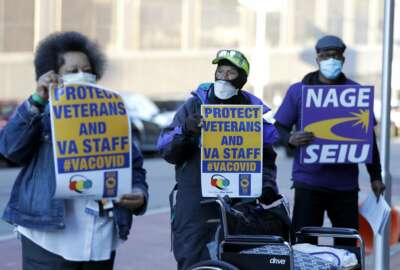

Workloads for people and agencies have ballooned during the crisis.
Theresa, I hope you are reading this. You called to ask if it would be possible to make a shout-out to postal employees who are busting their butts during the pandemic. Here is it: Thank you!
A U.S. Postal Service carrier in Maryland, Theresa was just looking for a little recognition. Working alone in the Federal News Network studios, I’ve been fielding quite a few phone calls. Some bring random requests, some are just off the wall. Theresa simply wanted the world to know that the explosion in package deliveries has manifested itself in the lives of USPS’s foot soldiers, its route delivery people.
USPS has loosened restrictions on overtime. So yes, its employees are earning more. But that doesn’t mean their work is easy. With people ordering more of everything online, including items like toilet paper that come in large boxes, a shift’s worth of packages often doesn’t fit in the Postal Service’s ancient route trucks. That means carriers have to make extra runs. Many, including Theresa, are also working Sundays. USPS doesn’t deliver mail on Sundays, but it does deliver packages under contracts with outfits like Amazon.
Theresa’s is just one tale among millions whose lives have changed for nobody knows how long.
Our big wigs jostle for attention and continually rewrite a barely coherent national response policy. Those who do the day-to-day work improvise.
Some tasks landing in their laps, why no one could have imagined. Case in point: the Small Business Administration. As Doug Criscitello, a former federal chief financial officer now with Grant Thornton, put it, SBA has had to make a quantity of loans in a few days equal to what it would normally do in 25 years. It hasn’t gone all that well, given the complicated and rickety machinery connecting Treasury, SBA and thousands of individual banks.
Besides making all of the processes somehow work, agencies have also had to improvise policy. Congress typically leaves details to agencies. Now, instead of having regular and deliberative rule-making to figure out how to carry out law, agencies have had to blow unprecedented amounts of greenbacks practically overnight, while feeling their way through the policy details.
When Congress changes tax policy, the IRS generally has to scramble to update its software code. The issues with that code are well known. Even then, though, the agency has several weeks or months to rewrite and test. Another story with the Cares Act. It turns out the IRS didn’t even possess some of the data on eligible individuals it needed to make the stimulus deposits.
So the pandemic effects people at the individual and organizational level.
And don’t forget, all this workload comes when most people are teleworking. Let’s not kid ourselves. When everyone is teleworking, many tasks become more difficult and slower. Distractions add up. I interviewed one bureau head the other morning. She was glad to have an early call because her two teenage sons were still asleep. Teenage boys have two basic states: sleeping and foraging for food.
The Office of Personnel Management, perhaps aware that some feds could shortly end up out of work, did issue a rough set of guidelines for reopening. It may not happen in time for those who will outlast their 80 hours of emergency sick leave. Congress granted the leave April 1st to those unable to work because of quarantine, or because they can’t telework.
The Federal Employees Education and Assistance Fund executive director Joyce Warner says she’s anticipating an uptick in applications for FEEA loans or grants when that happens. So far, FEEA hasn’t seen many requests. Typically it gets them when government shutdowns delay pay, or when a natural disaster forces people out of their homes.
In the meantime, FEEA has assembled a resource guide for help that is available to feds.
Warner tells me she’s heard from some of the federal employee unions that people will soon feel the pinch, moving from emergency paid leave to leave without pay.
Another charitable group expecting a rise demand is Friends of Patients at the NIH. Executive Director Heidi Williams expects clinical trials of covid-19 to bring new patients to NIH. Friends helps patients and their families with housing and transportation — and a bit of emotional support. In so doing, it also aids the NIH medical staff.
Both organizations need your help. OPM just reopened the Combined Federal Campaign in a sort of Christmas in Springtime gesture. Here’s another way you can give: Join me in reality or virtually in my upcoming charity motorcycle ride. Proceeds will split evenly between FEEA and Friends. Find the signup link at our special web page. If you ride, join up. If you know someone who rides or always longed to ride, please consider a contribution.
We’re scheduled to roll Friday, June 26th. That could change, given the situation. Either way, you’ll be helping a couple of great causes.
By Amelia Brust
In 2010 Colgate-Palmolive and GlaxoSmithKline Plc sued each other over who could depict a “nurdle,” a.k.a. the glob of toothpaste on a toothbrush, on packaging. They settled out of court a year later.
Source: Reuters
Copyright © 2025 Federal News Network. All rights reserved. This website is not intended for users located within the European Economic Area.
Tom Temin is host of the Federal Drive and has been providing insight on federal technology and management issues for more than 30 years.
Follow @tteminWFED


